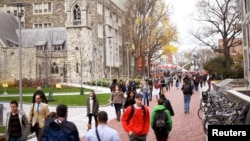About a quarter of students at 66 tertiary institutions in the United States said they had gone hungry in the previous month, researchers said Tuesday.
Experts said the findings, which are from the largest survey to measure hunger on campuses, confirmed concerns over poverty's prevalence at universities and colleges.
Jed Richardson, a scientist with the University of Wisconsin-Madison, and one of the researchers, said high-living costs, including tuition fees in some instances, might explain the results.
"For students who need to spend a certain amount of time at school not working, the jobs that they can get are generally low-paying," he told Reuters by phone. "They're forced to cut back."
Researchers quizzed 43,000 students at universities and community colleges in 20 states and the District of Columbia last year.
About 20 percent of university students said a lack of money meant they had been hungry and had not eaten in the previous month.
That proportion increased to 24 percent for those registered in community colleges, which primarily offer lower-cost two-year programs.
Other students ate less or skipped meals due to money worries.
The survey, conducted online, was the largest to date to identify how poverty afflicts university students, Richardson said.
There have been a growing number of similar studies in the past five years, he said, but those were conducted at the state- or university-level.
This study found that hunger disproportionately affected marginalized students, such as former foster youth and LGBT students, as well as African-Americans and Native Americans.
Problem often goes unnoticed
Because researchers could survey students at only a small fraction of colleges — those that asked to participate in the study — the results could not be generalized to the entire student population of the United States, Richardson said.
The results illustrate poverty among students that often goes unnoticed, said Nicole Kasper, a post-doctoral fellow in nutritional sciences at the University of Michigan, in Ann Arbor, who has researched food insecurity on campuses.
Kasper was surprised by the results of a 2016 study she co-authored that found four in 10 students surveyed at her upscale school faced hunger, she said.
"At our university, there's a big stereotype about the students being really wealthy," she said by phone.
Evidence of hunger on campus contrasts with the widespread belief — dubbed "Freshman 15" — that college students during their first year on campus, or freshman year, gain 15 pounds due to buffet-style meal plans common in dormitories, Kasper said.
A 2008 study published in the Journal of American College Health found freshmen gained 2.7 pounds on average.









